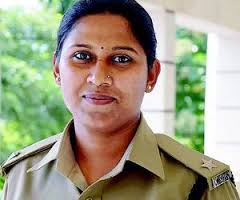Udupi, Jun 5: Anupama Shenoy, Deputy Superintendent of Police (DySP), Kudligi sub-division of Ballari district, who made the headlines after she was transferred in January for putting a call from district in charge and labour minister P T Parameshwar Naik's on hold, has reportedly tendered her resignation here on Saturday.
 The shocking development comes after a group of people gathered in front of her office in Kudligi town on Saturday protesting the arrest of three people on Friday evening over the construction of an illegal building allegedly for liquor shop or storage.
The shocking development comes after a group of people gathered in front of her office in Kudligi town on Saturday protesting the arrest of three people on Friday evening over the construction of an illegal building allegedly for liquor shop or storage.
Anupama Shenoy, daughter of Radhakrishna Shenoy, who runs a small canteen at Uchila village in Udupi district, left for her present hometown in Shivamogga after the sudden resignation.
Superintendent of Police R Chetan said Anupama resigned as she was hurt by the protest by a few organisations and local Panchamasali community leaders. The police had taken community leader P?Ravikumar, town panchayat member Rajanikanth and liquor shop worker Krishnappa into custody.
When protesters raised slogans against her alleging that she assaulted the three people who had been taken into custody, she reportedly told the protesters that she could not do her duty in a such an atmosphere and was going to resign.
Sources said she rushed into her chamber, wrote out her resignation letter, summoned an inspector to whom she handed over an envelope saying that it was her resignation letter and asked that it be forwarded to her superior officer.
Ms. Shenoy should have submitted her resignation to Inspector General of Police (IGP), Ballari Range through the Superintendent of Police, Ballari, but instead, handed over her resignation letter to her junior officer, circle police inspector Nagappa Bankali. Ballari SP R Chetan meanwhile confirmed that Ms Shenoy had submitted her resignation through her subordinate officer.
According to sources, a couple of days ago, leaders of Dalit organisations had complained to her over the construction, by Veerendra Kumar, a local politician, who owns a couple of liquor shops in the town, of a building that would serve as a liquor shop.
Dalit leaders who opposed a liquor shop coming up next to Ambedkar Bhavan, said the construction of the building would also close the approach road to Ambedkar Bhavan. Ms Shenoy had asked building owners to stop construction activity until it is proved whether construction of the building was being carried out on land owned by Mr Veerendra Kumar.
However, defying the orders of the DySP, construction activity continued with the owner stating that it was his own property and his family had some years ago donated a piece of land for the construction of Ambedkar Bhavan.
On Friday evening, police took three people from the building construction site into custody for defying the DySP's orders. The arrest triggered tension in the town, the next day. Sources said, senior officials took the officer to task. Upset, the officer reportedly tendered her resignation.
The officer was also in the forefront of stopping illegal liquor mafia in her jurisdiction, when she was abruptly transferred on the day the Election Commission announced the code of conduct for Zilla and Taluk Panchayat elections in the State.





Comments
It really shows the failure of the public of that region.. When the officer resigned and left...Public should have protested to keep such officers in duty and let the culprits enjoy jail......
WE are the one who should change......NOT India.........or the Sarkaar..
Dear Madam,
You are a great Lady. You should not resign. Please try to stay in the same vicinity and control them. God help you. Learn Karate and Judo. No one will touch you.
Good luck.
Add new comment